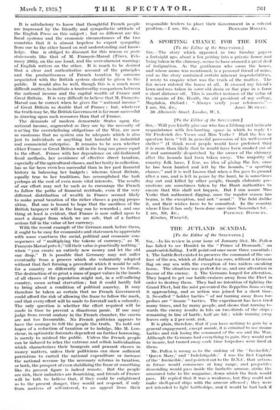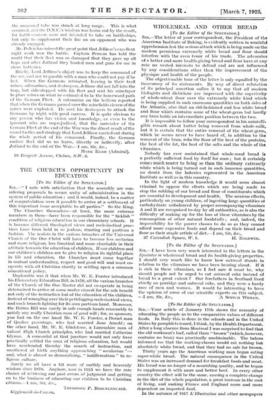THE JUTLAND SCANDAL
[To the Editor of the SPECTATOR.]
Sue,—In his review in your issue of January 31st, Mr. Pollen has failed to see Hamlet in the " Prince of Denmark," an amateurish failing. I will point out once more three essentials : 1. The battle fleet existed to preserve the command of the sur- face of the sea, which at Jutland was ours, without a German flag on any sea with the exception of two raiders sneaking home. The situation was perfect for us, and any alteration in favour of the enemy. 2. The Germans longed for alteration. They hoped to get our battle-cruisers away from the Fleet in order to destroy them. They had no intention of fighting the Grand Fleet, but the mist prevented the Zeppelins from seeing it approaching, and so action was joined for a short time. 3. So-called " bolder tactics " of not turning away from tor- pedoes are " insane " tactics. The experiment has been tried many times, and by many people, and shows that turning to- wards the enemy results in hits on two-thirds of the ships ; remaining in line of battle, half are hit ; while turning away leaves only a 2 per cent. risk.
It is plain, therefore, that if you have nothing to gain by a general engagement, except morale, it is criminal to use insane tactics and risk losing the command of the sea and the War. Although the Germans had everything to gain, they would not be insane, but turned away each time torpedoes were fired at -them.
• Mr. Pollen is wrong as to the sinking of the Invincible,' ' Queen Mary,' and Indefatigable.' I was the first Captain of the Invincible,' and pointed out to the D.N.C. that actions in future would commence at long range, and projectiles descending would pass inside the barbette armour, strike the armoured tube to the magazine, down which the flash would pass. He replied that it was a weakness, but they could not make shell-proof ships with the armour allowed ; they were not intended to fight battleships, and- it would be bad luck if
the armoured tube was struck at long range. This is what occurred, and the D.N.C.'s wisdom Naas borne out by the result, for battle-cruisers were not intended to take on battleships, but only to supplement their fire on an opponent who was already engaged.
Mr. Pollen has missed the great point that Jellicoe's excellent night work won the battle. Captain Perseus has told the world that their fleet was so damaged that they gave up all hope and after Jutland they landed men and guns for use in shore batteries.
Briefly, Lord Jellicoe's object was to keep the command of the sea, and not to gamble with a man who could not pay if he last. When the Germans retreated, leaving in their trail mines, submarines, and destroyers, Jellieoe did not fall into the trap, but side-stepped with his fleet and sent his minelayer to place mines on what lie estimated to be the homeward path of the German Fleet. A submarine on the bottom reported that when the Germans passed over the minefields eleven of the mines were exploded. He sent his destroyers to attack the Germans by night with good success. It is quite obvious to any person who has vision and knowledge, or even to the ignorant who are unprejudiced, that the surrender of the German Fleet at the end of the War 'was the direct result of the sound tactics and strategy that Lord Jellicoe carried out during the whole period of his command. Finally, the German surface fleet did us no harm, directly or indirectly, after Jutland to the end of the War.—I am, Sir, &c.,
MARK KERR (Admiral).
19 Draycoll Avenue, Chelsea, S.W. 3.



























































 Previous page
Previous page